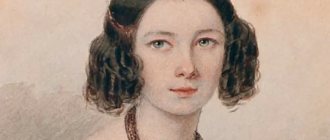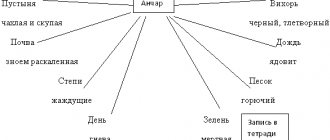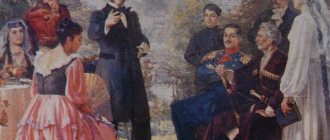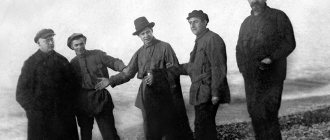History of creation
“Prayer” was written by M.Yu. Lermontov in 1839 .
Autumn and winter 1839-1840. Lermontov spent time in St. Petersburg. He was already popular and was often invited to evenings in secular salons.
At one of the evenings at the Karamzins’, he met Maria Alekseevna Shcherbatova. He really liked the young and beautiful widow, the poet also made a great impression on her. They talked often and for a long time.
A.O. Smirnova-Rosset recalled how, in her presence, Lermontov complained to Shcherbatova about the melancholy that overwhelmed him at times. In response, Maria Alekseevna asked if he prayed at such moments, to which Lermontov said that he had forgotten all the prayers. Shcherbatova immediately read “Theotokos” to him. The poet walked away, and towards the end of the evening he presented Maria Alekseevna with the poem “Prayer”.
This work quickly gained popularity, but was published after the death of the author. Belinsky called him one of the most significant in the poet’s creative baggage.
The history of the creation of the poem Prayer
Lermontov "Prayer". History of creation.
the poem “Prayer,” written in
1939
, to Princess Maria Shcherbatova.
This extraordinary woman inspired him to create several wonderful lyrical texts. According to the memoirs of contemporaries, she was beautiful, smart beyond her years, and studied literature and art. M. Glinka, who later wrote a romance based on these poems, loved to visit her house; the princess herself often visited the literary salon of the Karamzins. She was 19
years old and Lermontov was 25 when they met.
Maria was already a widow, having been married for about a year, and Lermontov returned from exile in the Caucasus. Her name is associated with the story of the poet's duel with the son of the French ambassador, Emile de Barant, who was enraged by his obvious preference for the beautiful Lermontov. During the duel, the baron shot first, but missed, and Lermontov coolly fired into the air. Despite the bloodless outcome, the case was made public. The poet was arrested and again exiled to the Caucasus. Princess Shcherbatova highly appreciated Lermontov's talent; he, who did not like literary readings in secular salons, made an exception for her. One day, he read The Demon, which he rethought and rewrote for many years. Maria Alekseevna was touched and delighted by the perfection of the poem, but was also concerned about the darkness of the content. She subsequently made Lermontov promise to turn to prayer if he felt sad. Apparently, the poet kept his word, which resonated in a heartfelt poetic message. It's difficult to explain the strange name. Prayers are the time-honored messages of believers to God, not poetic, enthusiastic texts. But in literature there are works that in some ways resemble Christian prayers and were written by deeply religious people. But Lermontov is difficult to classify as such people. His work often featured demonic images and a rebellious spirit. Elizaveta Alekseevna Arsenyeva was worried about her grandson, they prayed for him every day, believing that he was possessed by a cursed heritage on his father’s side - a relationship with the Scottish medieval warlock Thomas Learmonth. She proudly showed her friends the text of the “Prayer,” saying that Mishenka was in vain called an atheist. Lermontov's poetry felt the influence of Western European romantic poetry, primarily Byron. Nevertheless, he wrote: “...not Byron, I am different,” calling himself a persecuted wanderer, but with a “Russian soul.” This Russian soul manifested itself in the intonation of the poem, which, like church hymns, is imbued with peace and grace, uniting romantic and Orthodox motifs. The feeling of sadness changes, previously it was akin to despair and hopelessness, now the sadness is bright, light. Previously, Lermontov wrote two texts with the same name. But in “Prayer” 1829,
the poet admits that he is far from divine providence, he is close to earthly passionate impulses, a thirst for creativity, and with his “sinful songs” he does not pray to God.
In 1837
, he turns in a poem with a prayer to the Mother of God, but asks not for his “desert” soul of a wanderer, but for an innocent virgin worthy of happiness and peace.
The poem of 1839
conveys with psychological subtlety the state of spiritual enlightenment of the lyrical hero after reading a wonderful prayer, which has the grace-filled power of living words and a magnetic force that gives peace. Belinsky, appreciating this poem, wrote that the rebellious poetic soul, pouring out “jolly, chilling the human heart” words, gave birth to a “prayerful, unctuous melody of hope, reconciliation and bliss of life” by life itself.
Subjects
Experiencing a state of mental crisis, the lyrical hero turns to God for help. He prays for peace and consolation to be sent down to him.
The poem does not contain the text of the prayer, but the author perfectly describes the beneficial effect of the “harmonies of living words” after which he “believes and cries, and so easily, easily...”.
Every person experiences difficult periods in life. Misunderstanding of others and loneliness increase despair, sadness, and confusion. How to cope with this heavy load? In the hope of finding peace of mind, the lyrical hero of the work turns to prayer. In it - “in the consonance of the words of the living” - he finds consolation.
Test on the lyrics of M.Yu. Lermontov in grade 10 test in Russian language (grade 10) on the topic
Test on the lyrics of M.Yu. Lermontov
Read M.Yu. Lermontov’s poem “Prayer” and complete the tasks
- What type of lyricism is the poem “Prayer”?
- Landscape lyrics
- Philosophical lyrics
- Love lyrics
- Freedom-loving lyrics
- The leading theme in the poem is:
- The saving power of words, poetry, art
- Motherland
- Friendship
- Freedom
- What is the name of the syntactic device used by Lermontov in the line: “And so easy, easy...”?
- Rhetorical exclamation
- Syntactic parallelism
- Antithesis
- Repeat
- In which stanza of the poem is the word “prayer” used?
- In the first
- In the second
- In the third
- There is no such stanza in the poem
- The lyrical hero of the poem
- In difficult moments of life, turns to prayer
- In difficult moments of life, he tries to sleep
- Desperate and cannot find spiritual support in anything
- Dreams of oblivion
- Name the artistic and expressive means used in the following phrases: “in a difficult moment”, “wonderful prayer”, “holy beauty”
- Write down a phrase from the second stanza that is a synonym for the word prayer
- Indicate the name of the artistic and expressive means used in the phrases: “the beauty is breathing,” “the burden will roll away,” “living words”
- Determine the meter in which the poem is written
- How does prayer in M.Yu. Lermontov’s poem help the lyrical hero find spiritual lightness?
Test on the lyrics of M.Yu. Lermontov
Read M.Yu. Lermontov’s poem “Angel” and complete the tasks
- What type of lyricism does the poem “Angel” belong to?
- Civil lyrics
- Philosophical lyrics
- Landscape lyrics
- Love lyrics
- The leading theme in the poem is:
- Love
- Motherland
- Songs
- Fates
- What is the name of the artistic and expressive means used by M.Yu. Lermontov, with the help of which the poet expresses his attitude towards the angel’s song: “quiet song”, “that holy song”?
- Metaphor
- Epithet
- Personification
- Comparison
- Which stanza tells us what the angel sang?
- In the first
- In the second
- In the third
- In the last
- The hero-narrator talks about an angel who carried a young soul into the world, who
- Brings his song to people
- He is afraid of people and therefore does not want anyone to hear him
- Curry favor with God and therefore pretend
- Proud of himself
- In the line “He sang about the great God, and His praise/was unfeigned...” repetition of homogeneous consonant sounds is used, giving this literary text a special sound and intonation expressiveness. Name this phonetic device
- Write down the word that in the poem characterizes “songs of the earth”
- Indicate the name of the artistic and expressive means used in the following phrases: “sound of song”, “sounds of heaven”
- Determine the meter in which the poem is written
- How does the song that the angel sings characterize him in the poem by M.Yu. Lermontov?
Test on the lyrics of M.Yu. Lermontov
Read the poem by M.Yu. Lermontov “When the yellowing field is worried” and complete the tasks
- What type of lyricism does the poem “Angel” belong to?
- Civil lyrics
- Freedom-loving lyrics
- Landscape lyrics
- Philosophical lyrics
- The leading theme in the poem is:
- Love
- Motherland
- Loneliness
- Freedom
- What is the name of the phonetic device used by M.Yu. Lermontov in the following lines: “Then the anxiety of my soul is humbled, / Then the wrinkles on my forehead disperse...”?
- Anaphora
- Epiphora
- Alliteration
- Assonance
- How many sentences are there in the poem?
- One
- Two
- Three
- Four
- The lyrical hero of the poem
- Can't be happy
- Can find happiness on earth under certain circumstances
- I forgot what happiness is
- Dreams of happiness after death
- In the line “From under the bush a silver lily of the valley / Shakes its head in a welcoming manner...” a stylistic figure is used, which consists of violating the usual word order in a sentence. Name this stylistic figure
- Write down the obsolete word used by the poet in the fourth stanza of the poem
- Indicate the name of the artistic and expressive means used in the following phrases: “yellowing field”, “ruddy evening”, “vague dream”
- Determine the meter in which the poem is written
- When can a lyrical hero comprehend happiness on earth?
Idea
The idea of the work is an image of the complex and contradictory inner world of the lyrical hero .
Contemporaries noted that Lermontov had a difficult character. He himself admitted that his character later caused frequent misunderstandings in relationships with other people and brought moral suffering to himself.
The theme of loneliness, his reflections on life, the desire to find understanding and ease his state of mind are reflected in other works of the poet.
Artistic originality of the work
The peculiarities of this work include the fact that the author was able to convey the essence of the prayer without naming it. The reader does not know what kind of prayer the author had in mind, but at the same time, the solemnity of the moment of the lyrical hero’s appeal to God is clearly felt. In particular, this is facilitated by pompous vocabulary: “wonderful prayer”, “gracious power”, etc.
The solemnity of the narrative is also enhanced by the sound design - in the first stanza, the multiple use of words with the sound “u” gives it a touch of church sound.
The work, being secular in writing - it does not use Church Slavonic vocabulary - at the same time, it conveys the high religious feeling that gripped the lyrical hero.
Analysis of the poem by M.Yu. Lermontov "Prayer"
Analysis of the poem by M.Yu. Lermontov "Prayer"
This little poem is a story about the most intimate: about prayer, about that moment when a person, not finding support in himself, in life, turns to God. What does he want to find? and what does it find?
The main words of the poem - “wonderful prayer”, “gracious power”, “holy charm” - are associated with faith, with the Christian tradition. It seems that we understand the word “gracious”. But is this the same as “Fertile Land”? In the Explanatory Dictionary of D.N. Ushakova, the meaning of this word is “full of blessings, contentment, happiness; pleasing." However, for a Russian believer of the last century, this word meant immeasurably more. The fact is that “grace” is the divine power with the help of which a person’s salvation is accomplished. Grace is the promise of salvation for the soul. To be saved, a person must add his faith and his repentance to the divine gift. Therefore, “the power of grace” is the power that brings a person hope of salvation. The word “gracious”, as it were, marks the culmination in the lyrical composition of the poem, marks the transition from darkness to light.
The beginning of the poem is rather gloomy: a difficult moment, there is sadness in the heart... The feeling of sadness and heaviness is emphasized by the verb “crowded.” At such a moment they turn to God - “I repeat one wonderful prayer by heart...” The poet does not name what prayer. The mystery remains. For the poet himself, the secret is the power of influence of the living words of prayer: “there is a grace-filled power in the consonance of living words, and an incomprehensible, holy charm breathes in them.” The main semantic load here is carried by epithets.
If the first stanza is a description of the state of the soul of the lyrical hero, his appeal to prayer, and the second is a description of the power and charm of the living words of this prayer, then the third stanza talks about the answer to prayer, about what “the power of grace” brings to a person: they leave melancholy and languor, they are replaced by faith, hope, tears of relief.
Together with the poet, we experience (co-experience) this movement of the soul from melancholy and sadness to hope and faith. In the poem, everything lives and changes along with this movement: the coloring of words and sounds, rhythm.
Let us note the antonymous oppositions in the first and third stanzas: difficult - easy, the chest is tight - the burden will roll away.
From the first to the last stanza the sound background of the poem also changes. In the first stanza, the sound background is created by a repeating [y] (even in all four rhymes there is a stressed [y]). For many, this sound is dark, nocturnal. Heavy iambic trimeter (not one of the twelve stresses is missing) emphasizes the feeling of languor and sadness of the lyrical hero.
But how everything is transformed under the influence of “living words”! In the last stanza, completely different vowels sound most strongly - open [a], [e]. The rhythm has also changed: in the second and third lines there are not three, but two stresses - the lines have become “lighter”, they seem to be “flying up”. All this allows us not only to understand, but also to experience, together with the poet, a feeling of relief and peace.
Even syntactic constructions are subordinate to the general movement and convey it. First, these are a few personal sentences - they describe the state of the soul and the power and charm of words addressed to God. But there is only one verb in the 1st person form - I repeat. This is the only action of the lyrical hero: he repeats the prayer - everything else happens to him: the action of living words is outside his will. The last two final lines are impersonal sentences: “and I believe” (cf.: “I began to believe”), “and weep” (cf.: “I cry”) and “so easily, easily” (words of the state category). Through The syntax conveys the author's sense of the existence of two different spheres: human and higher, divine.
The entire work is a description of a single impulse of the soul and its changing state. The poem “Prayer” could not even have been inspired by the poet’s own experiences, but he put them into such sincere, inspiring words that make the reader feel involved in this impulse of the soul.
Meaning of the work
The poem “Prayer” can be called the source of religious and philosophical lyrics. This tradition was later continued by A. Blok and S. Yesenin.
Written in clear and simple language, “Prayer” has become a truly popular work. For almost two centuries, M. Glinka’s romance to the words of Lermontov enjoyed enormous popularity in various strata of society; it is still in the classical repertoire of many opera singers. Other composers also wrote their own music for this work.









